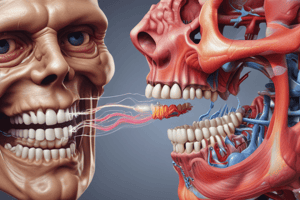Podcast
Questions and Answers
Which type of myoclonus can be induced by drugs or toxins and is potentially treatable?
Which type of myoclonus can be induced by drugs or toxins and is potentially treatable?
- Physiological myoclonus
- Secondary myoclonus (correct)
- Essential myoclonus
- Epileptic myoclonus
What should be identified during the examination of a patient with myoclonus?
What should be identified during the examination of a patient with myoclonus?
- The age of onset of the myoclonus
- The cause of the myoclonus
- The patient's family history of myoclonus
- The distribution, temporal profile, and activation characteristics of the myoclonic movement (correct)
Which ancillary test is useful in identifying both ictal and interictal patterns in the epileptic myoclonus category?
Which ancillary test is useful in identifying both ictal and interictal patterns in the epileptic myoclonus category?
- EEG (correct)
- Electrolyte test
- Thyroid function test
- Glucose test
Study Notes
Guidelines for Evaluating Patients with Myoclonus
- Myoclonus can be classified as physiological, essential, epileptic, or secondary myoclonus based on clinical features.
- The initial steps in evaluating a patient with myoclonus are history and examination.
- The examination should identify the distribution, temporal profile, and activation characteristics of the myoclonic movement.
- Myoclonus can be confused with other involuntary movements such as chorea, dystonia, tremor, and tics.
- Clinical neurophysiology studies can help differentiate myoclonus from other involuntary movements.
- Myoclonus induced by drugs or toxins is potentially treatable and can resolve upon withdrawal of the offending agent(s).
- Ancillary testing should be performed if the myoclonus etiology is unclear from history and examination findings.
- Suggested ancillary tests include electrolytes, glucose, renal and liver function tests, thyroid function tests, and vitamin E level.
- Brain imaging and spine imaging may reveal lesions or atrophy supporting a specific myoclonus etiology.
- EEG can identify both ictal and interictal patterns in the epileptic myoclonus category.
- Infection workup may be necessary if there are localizing signs of fever, leukocytosis, or encephalopathy.
- Cerebrospinal fluid analysis is useful to differentiate an infectious/inflammatory etiology from a toxic, drug-induced, or metabolic etiology.
Studying That Suits You
Use AI to generate personalized quizzes and flashcards to suit your learning preferences.
Description
Test your knowledge on the evaluation of patients with myoclonus with this informative quiz! Myoclonus can be caused by a variety of factors and identifying the underlying cause is crucial for effective treatment. This quiz will cover the initial steps in evaluating patients with myoclonus, the differentiation of myoclonus from other involuntary movements, and the ancillary testing necessary to determine the etiology of myoclonus. Challenge yourself and learn more about this important neurological condition.





